|
|
|
Sort Order |
|
|
|
Items / Page
|
|
|
|
|
|
|
| Srl | Item |
| 1 |
ID:
153895
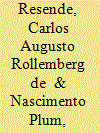

|
|
|
|
|
| Summary/Abstract |
The Brazilian-Argentine Agency for Accounting and Control of Nuclear Materials (ABACC) is a unique bilateral nonproliferation regime created by Brazil and Argentina after a long process of negotiations and confidence building. The creation of the agency in July 1991 marked a paradigmatic shift in the Brazilian-Argentine relationship, converting their long rivalry into a profound strategic partnership. This article presents a historical overview of the creation of ABACC and discusses how it paved the way for the integration of Brazil and Argentina into the nonproliferation regime. The article also shows how ABACC tackled nonproliferation challenges in the twenty-first century, helping Brazil and Argentina continue their nuclear programs with fewer risks to the autonomy and development goals traditionally defended in their foreign policies.
|
|
|
|
|
|
|
|
|
|
|
|
|
|
|
|
| 2 |
ID:
152032
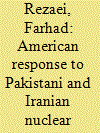

|
|
|
|
|
| Summary/Abstract |
This article explores the paradox in the reaction of the United States to the two different proliferation cases: Pakistan's proliferation and Iran's weaponization effort. The article tries to find answer to the following key question; why the United States, as one of the guardians of the Non-proliferation Treaty (NPT) which would prefer to see a region that is entirely free of weapons of mass destruction, ultimately has accepted Pakistan's proliferation, while imposed considerable amount of pressure to stop Iran from acquiring nuclear weapons.
|
|
|
|
|
|
|
|
|
|
|
|
|
|
|
|
| 3 |
ID:
000744
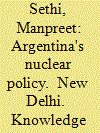

|
|
|
|
|
| Publication |
New Delhi, Knowledge world, 1999.
|
| Description |
x, 220p.
|
| Standard Number |
8186019197
|
|
|
|
|
|
|
|
|
|
|
|
Copies: C:2/I:0,R:0,Q:0
Circulation
| Accession# | Call# | Current Location | Status | Policy | Location |
| 042171 | 355.8251190982/SET 042171 | Main | On Shelf | General | |
| 042172 | 355.8251190982/SET 042172 | Main | On Shelf | General | |
|
|
|
|
| 4 |
ID:
126318
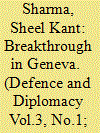

|
|
|
|
|
| Publication |
2013.
|
| Summary/Abstract |
It is just 10 days since Iran its interlocutors reached an interim deal in Geneva and its implementation has commenced with the announcement of a visit by the international Atomic Energy Agency (IAEA) to the heavy water reactor project at Arak. The interim deal is about a temporary freeze, as a first step, in the progress of diverse aspect of the Iranian nuclear program but is of considerable significance even as a first step. This is because of the agreed links in the initial steps, with marginal softening of sanctions and the promise of no more of them. The deal also lays down in a comprehensive package the goal of negotiations and a process towards that goal which has been on the card of many months. An linking of the progress was felt when Iran and the IAEA accepted a work plan on November 11, 2013, to resolve outstanding issues. The subsequent negotiations in Geneva among the foreign Ministers of Iran and the P-5 plus Germany till the wee hours of November 24, 2013, were hard and intensive. Foreign Minister Zarif tweeted on the conclusion these negotiations that "there is white smoke".
|
|
|
|
|
|
|
|
|
|
|
|
|
|
|
|
| 5 |
ID:
087044
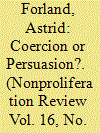

|
|
|
|
|
| Publication |
2009.
|
| Summary/Abstract |
From 1961 to 1963, an interagency debate took place within the Kennedy administration as to whether to use persuasion or more coercive means in order to multilateralize nuclear safeguards, that is, to make the International Atomic Energy Agency (IAEA) the administrator of safeguards on bilateral nuclear exports from the United States. Persuasion as a general rule was deemed preferable, in order to make the many states that had misgivings about IAEA safeguards accept multilateralization. The coercion-persuasion debate followed years of trying to establish a "common front" among Western nuclear suppliers with regard to nuclear safeguards. Disagreement about the intrusiveness of the system proved a major obstacle, but eventually a common position reflecting the need to take international opinion into consideration was agreed. The adoption of the first IAEA safeguards document in 1961 created for the first time a common standard for the application of safeguards. This was a prerequisite to the U.S. policy of transferring to the IAEA the administration of safeguards on bilateral nuclear agreements. The resulting multilateralization of safeguards laid the groundwork for the IAEA to become the universal safeguarder in connection with the Treaty on the Non-Proliferation of Nuclear Weapons-an unforeseen outcome, since at the outset, IAEA safeguards were perceived as a "holding operation" while waiting for a disarmament agreement.
|
|
|
|
|
|
|
|
|
|
|
|
|
|
|
|
| 6 |
ID:
094496
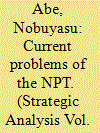

|
|
|
|
|
| Publication |
2010.
|
| Summary/Abstract |
With the 'world without nuclear weapons' speech by President Obama and the other moves, indications are good for the next Nuclear Non-Proliferation Treaty (NPT) Review Conference. Progress has to be made on the Comprehensive Test Ban Treaty (CTBT), the proposed fissile materials cut-off treaty (FMCT), Negative Security Assurance (NSA), and reducing the role of nuclear weapons. On the non-proliferation side, the Additional Protocol must be made a standard, the International Atomic Energy Agency (IAEA) strengthened, and NPT withdrawal acted on decisively. To avoid the threat of nuclear terrorism, a series of measures has to be applied with perseverance. The only realistic way to address the Middle East question is to proceed in parallel on regional peace and the region free of weapons of mass destruction (WMD).
|
|
|
|
|
|
|
|
|
|
|
|
|
|
|
|
| 7 |
ID:
169456


|
|
|
|
|
| Summary/Abstract |
Researchers have recently proposed a new approach to nuclear-arms-control verification, dubbed “deferred verification.” The concept forgoes inspections at sensitive nuclear sites and of nuclear weapons or components in classified form. To implement this concept, a state first divides its nuclear program into a closed segment and an open segment. The total fissile-material inventory in the closed segment, which includes the weapon complex, is known and declared with very high accuracy. Essentially no inspections take place in the closed segment. In contrast, inspectors have access to the open segment, which includes in particular the civilian nuclear sector. The fissile-material inventory in the open segment is known with less accuracy, but uncertainties can be reduced over time using nuclear-archaeology methods. Deferred verification relies primarily on established safeguards techniques and avoids many unresolved verification challenges, such as the need for information barriers for warhead confirmation measurements. At the same time, deferred verification faces some unique challenges. Here, we explore some of these challenges and offer possible solutions; to do so, we examine possible noncompliance strategies in which a state would seek to withhold a higher-than-declared inventory.
|
|
|
|
|
|
|
|
|
|
|
|
|
|
|
|
| 8 |
ID:
093562
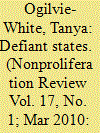

|
|
|
|
|
| Publication |
2010.
|
| Summary/Abstract |
This article explores the potential impact of U.S. disarmament leadership on the nuclear diplomacy of North Korea and Iran, the "defiant states." The first part of the article introduces the concept of "interaction capacity," which measures a state's integration into international society, based on its physical communication systems and its adoption of shared norms. The theory predicts that lower levels of interaction capacity will generate a greater propensity for nuclear defiance, as the affected states reject and try to resist integration pressures. In the second and third parts of the article, this conceptual framework is applied to the cases of North Korea and Iran. The analysis suggests that efforts to reassert U.S. disarmament leadership could increase the alienation of North Korea and Iran, leading to provocation and escalation of nuclear tensions. The final part of the paper explores the policy implications of this analysis for the potentially defunct six-party talks, for hopes of renewed negotiations with Iran, and for the 2010 Review Conference of the Treaty on the Non-Proliferation of Nuclear Weapons.
|
|
|
|
|
|
|
|
|
|
|
|
|
|
|
|
| 9 |
ID:
001042
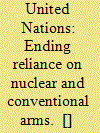

|
|
|
|
|
| Publication |
New York, United Nations, 1995.
|
| Description |
x,155p.
|
| Standard Number |
9211422167
|
|
|
|
|
|
|
|
|
|
|
|
Copies: C:1/I:0,R:0,Q:0
Circulation
| Accession# | Call# | Current Location | Status | Policy | Location |
| 037815 | 327.174/UNI 037815 | Main | On Shelf | General | |
|
|
|
|
| 10 |
ID:
083839


|
|
|
|
|
| Publication |
2008.
|
| Summary/Abstract |
Export controls and international safeguards are central to ensuring international confidence in the peaceful uses of nuclear materials and technologies and to achieving adequate oversight on the transfer and use of nuclear materials, technology, and equipment required for the development of proliferation-sensitive parts of the nuclear fuel cycle. Although the independent strengths of export controls and international safeguards rely largely on universal adherence, there may be opportunities to exploit the shared strengths of these systems. This article provides background information on the separate evolution of export controls and international safeguards, considers how these two elements of the nonproliferation regime interact, and identifies some possible avenues that could, over time, lead to wholly integrated activities.
|
|
|
|
|
|
|
|
|
|
|
|
|
|
|
|
| 11 |
ID:
089069


|
|
|
|
|
| Publication |
2009.
|
| Summary/Abstract |
How do we assess the health of international regimes? Many analysts have insisted recently that the nuclear nonproliferation regime is in urgent need of repair or that it should even be discarded because of its supposed ineffectiveness. However, it is essential that statements about the regime being in crisis be scrutinized for veracity and utility. While the spread of nuclear weapons poses an undeniable and serious threat to international security, a mistaken crisis mentality with respect to the regime could lead to rash attempts to alter it in unnecessary or ineffective ways or, at worst, to discard it completely. This paper returns to a theoretical framework that differentiates regimes, across both issue areas and time, to provide a more specified evaluation of regime health. By disaggregating the nuclear nonproliferation regime and assessing the individual and interactive health of multiple dimensions, a number of dimension-specific, regime-strengthening policy recommendations emerge.
|
|
|
|
|
|
|
|
|
|
|
|
|
|
|
|
| 12 |
ID:
060612
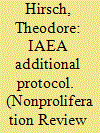

|
|
|
|
|
| Publication |
Fall-Winter 2004.
|
|
|
|
|
|
|
|
|
|
|
|
|
|
|
|
| 13 |
ID:
012693
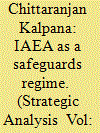

|
|
|
|
|
| Publication |
Oct 1997.
|
| Description |
1087-1106
|
|
|
|
|
|
|
|
|
|
|
|
|
|
|
|
| 14 |
ID:
053696
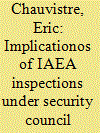

|
|
|
|
|
| Publication |
New York, United Nations, 1992.
|
| Description |
xi, 84p.
|
| Series |
Research paper; no.11
|
| Standard Number |
9290450592
|
|
|
|
|
|
|
|
|
|
|
|
Copies: C:1/I:0,R:0,Q:0
Circulation
| Accession# | Call# | Current Location | Status | Policy | Location |
| 035733 | 341.734/CHA 035733 | Main | On Shelf | General | |
|
|
|
|
| 15 |
ID:
050577
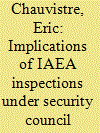

|
|
|
|
|
| Publication |
New York, United Nations, 1992.
|
| Description |
xi, 84p.
|
| Series |
Research papers; no.11
|
| Standard Number |
9290450592
|
|
|
|
|
|
|
|
|
|
|
|
Copies: C:1/I:0,R:0,Q:0
Circulation
| Accession# | Call# | Current Location | Status | Policy | Location |
| 034831 | 341.734/CHA 034831 | Main | On Shelf | General | |
|
|
|
|
| 16 |
ID:
053695
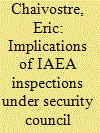

|
|
|
|
|
| Publication |
New York, United Nations, 1992.
|
| Description |
xi, 84p.
|
| Series |
Research papers; No.11
|
| Standard Number |
9290450592
|
|
|
|
|
|
|
|
|
|
|
|
Copies: C:1/I:0,R:0,Q:0
Circulation
| Accession# | Call# | Current Location | Status | Policy | Location |
| 033735 | 341.734/CHA 033735 | Main | On Shelf | General | |
|
|
|
|
| 17 |
ID:
094562
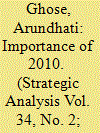

|
|
|
|
|
| Publication |
2010.
|
| Summary/Abstract |
In international relations, the more powerful have a way of underplaying history or overemphasising it, depending on how helpful or otherwise it may be in promoting their immediate objectives. It is interesting to note that even a country like India, which is beginning to sense the stirrings of power, is tending to fall into the same pattern. While this may be generally true, the expressions of power in the context of the non-proliferation of nuclear weapons, as becomes evident from an assessment of the five yearly Review Conferences of the Nuclear Non-Proliferation Treaty (NPT), have been more pronounced than perhaps in any other area of international relations.
|
|
|
|
|
|
|
|
|
|
|
|
|
|
|
|
| 18 |
ID:
127129
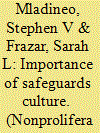

|
|
|
|
|
| Publication |
2013.
|
| Summary/Abstract |
International safeguards is the system of measures put in place by the International Atomic Energy Agency and states to ensure nuclear programs remain dedicated to peaceful purposes. This international safeguards system consists of agreements, inspections, and evaluations that have never considered the safeguards culture of a state or facility. Neither a common definition nor an understanding of safeguards culture is internationally recognized. This article provides an analysis of the concept of safeguards culture and gauges its value to the international safeguards community. The authors explore distinctions among safeguards culture, safeguards compliance, and safeguards performance, and suggest possible indicators of safeguards culture and methods to promote a strong, positive safeguards culture.
|
|
|
|
|
|
|
|
|
|
|
|
|
|
|
|
| 19 |
ID:
096506
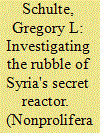

|
|
|
|
|
| Publication |
2010.
|
| Summary/Abstract |
Damascus has severely impeded an investigation by the International Atomic Energy Agency (IAEA) into Syria's construction of a covert nuclear reactor, which was destroyed in a 2007 Israeli air strike. Pressing Damascus to cooperate with the inquiry is necessary to ascertain that there are no other undeclared activities in Syria, to determine the role of North Korea in the construction of the reactor, and to help prevent future clandestine efforts. With Damascus doing its best to avoid the investigation, securing Syrian cooperation will require adept diplomacy backed by the prospect of special inspections and, if necessary, a referral to the UN Security Council. The case of Syria's secret reactor highlights areas in which the IAEA needs buttressing, from the enhanced sharing of information, to reporting that is less political and more forthright. The case also illustrates the downside of politicizing IAEA investigations and supports the new director's apparent intent to return the agency to its core technical tasks.
|
|
|
|
|
|
|
|
|
|
|
|
|
|
|
|
| 20 |
ID:
118544
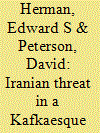

|
|
|
|
|
| Publication |
2012.
|
| Summary/Abstract |
From June 2003 to August 2012, the International Atomic Energy Agency published thirty-eight full written reports on Iran's nuclear program and conducted numerous inspections in the country. Yet although the Agency has never determined that Iran is pursuing nuclear weapons, Iran has never been able to free itself from the relentless U.S. campaign against its nuclear program. This article shows how the United States has mobilized the multilateral institutions to place Iran's nuclear program on the international stage and kept it there. It also examines the parallel role played by the news media, which have resumed their role of a decade ago when they helped Washington make a fraudulent case for invading Iraq on "weapons of mass destruction" grounds. The essay contends that the alleged Iranian nuclear weapons threat is a U.S. and Israeli propaganda construct intended to mask their own real threat to attack Iran.
|
|
|
|
|
|
|
|
|
|
|
|
|
|
|
|
|
|
|
|
|